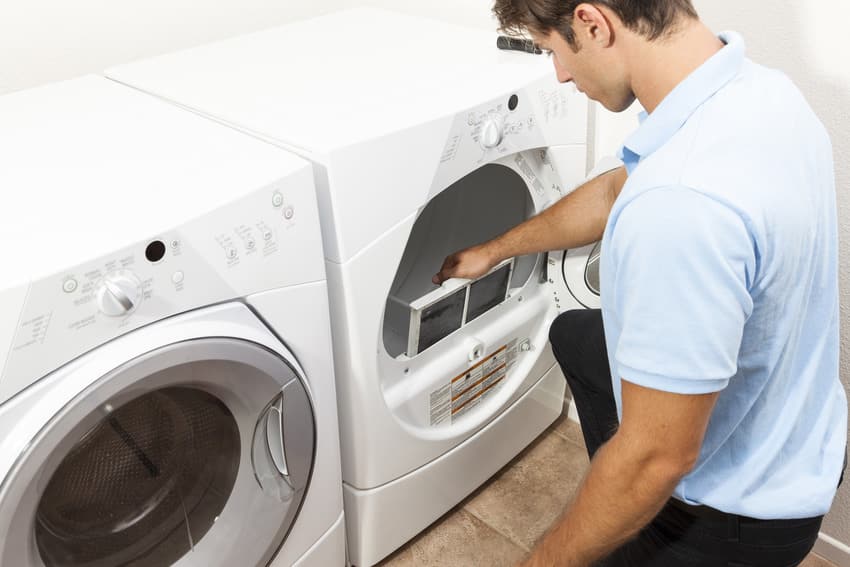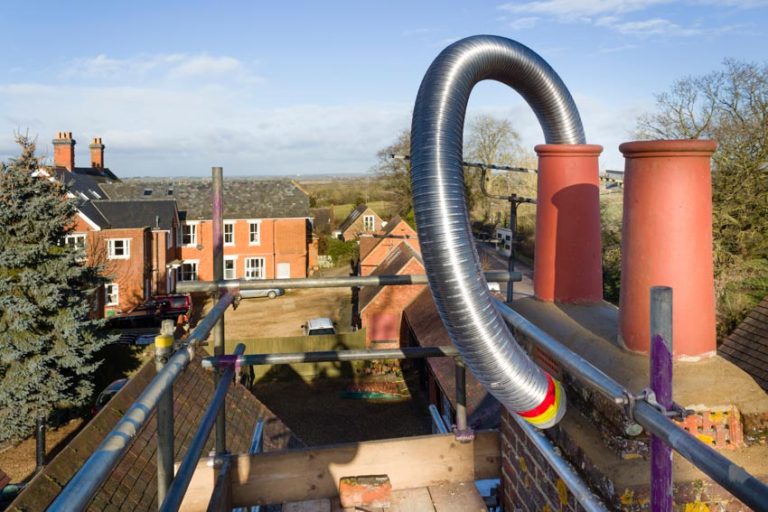Gas vs Electric Dryers: Pros and Cons & What To Choose

Dryers, the seasonal savior, have become an indispensable household item cutting half of the time and effort spent on drying the laundry. For preparation, it’d be best to learn more about the different types that are best suited to your needs. One of the first things to consider when buying is whether you prefer a gas or electric model. Check out the differences between gas vs electric dryers in terms of cost, efficiency, and safety features of each type below.
Difference Between Gas and Electric
A gas dryer, despite its name, also uses electricity to power up the fan, lights, drum, and controls while utilizing natural gas or propane to generate heat. Alternatively, electric models use electricity to heat the coils that produce the heat. Thus, both of these gas and electric appliances use electricity to operate but differ in how they heat air to dry laundry.
Gas Dryer –120-volt outlet and gas outlet (usually colored yellow)
Electric Dryer – 240-volt outlet
Of the 89 million residential clothes dryers in the US, 75% are electrical models while 25% use natural gas. Moreover, NRDC or Natural Resources Defense Council natural gas models usually cost 50% to 75% less to operate than electric units. Here we share the gas vs electric dryers pros and cons to help you decide.
Gas Pros & Cons

Gas dryers produce hot air using natural-gas or propane, pulling air through its vents and across the burner, and into the drum. Power, lights, and drum use electricity, so you’ll need a power outlet and a capped-off gas line.
Energy Efficient. Operating costs are often ½ of an electric dryer. Unlike electric models that use a coil to produce heat, gas units operate using a burner that heats instantly.
Furthermore, the gas-operated appliance is equipped with a moisture sensor that enables it to gauge how fast your clothes are drying. If there is not enough dampness present, it can adjust the drying time accordingly, reducing the energy usage as much as possible.
Faster Drying Time. Along with its energy efficiency, you get a faster drying time. On average, gas dryers can dry clothes twice faster than electric. This means you save more time and energy.
Gentle on Clothes. The built-in moisture sensor of these models prevents over-drying while saving energy. This preserves the color, elasticity, and fiber durability of your clothes.
In addition, these gas appliances do not need to tumble as much to achieve dryness, compared to electric that will require double revolutions, which can damage the cloth in the process.
Lower Costs in the Long Run. Their energy efficiency is a major factor in reducing costs. Aside from lower operating costs, the lesser damage on your garments means you don’t have to purchase new clothes now and then. Though take note that offsetting your startup costs can take several years depending on your model, local gas, and electricity prices.
No issues with Grounding. Homes built before the year 2000 typically have two hot slots and one neutral ground slot. The newer receptacles separate the neutral and ground. You can change the dyer cord to match, but doing this can pose dangerous risks if done as a DIY.
Cons
High Installation Costs. Aside from the need for having a professional installer, gas dryers are usually more expensive than electric. Also, a qualified technician is required for the maintenance and repair of gas dryers. If you don’t have a natural-gas hookup line, then you’ll need to spend on piping construction as well.
All washers and dryers require electricity so there is truly no all-gas dryer. So you will still need an electrical outlet and a natural gas connection.
Electric Pros & Cons

Electric appliances operate by using electric current to heat the coils where they create resistance. The heat generated is then transferred by the surrounding air and blown by a fan throughout.
Pros:
Low Startup Costs. This is probably the most attractive feature, perfect for homeowners who want to install as soon as possible. Setting up a gas dryer will cost you more, especially if you don’t have a natural-gas hookup in your neighborhood.
Typically, there’s an additional fee for this added feature charged by the utility company and another added fee to secure a safe connection. Electric models are also cheaper and easier to repair. Moreover, it can be installed by anyone who has a fair amount of experience in electrical wiring and appliance installation.
It is Possible to Install Anywhere. There’s less hassle in relocating or installing a brand-new electric dryer anywhere in your home as you don’t need a gas line to operate. Instead, you can use an adapter or swap out your power cord whether you have a three-prong or four-prong outlet. Unless you have a ventless dryer, you’ll also need to consider your vent attachment just like a gas unit requires.
More Models to Choose From. More model versions mean a wider price range and features. From basic models such as one heat setting to premium brands, you can choose the best dryer dimensions or size, design, and other features that best fit your needs.
Cons:
Slower Drying Time. Typical electrical units are slower to heat up and thus slower to dry up clothes.
Potential to Damage Fabric. As garments are subjected to heat, this can potentially damage the structural integrity of your fabric, depending on the duration. The color can also fade from the high heat exposure.
High-Cost Operations. Since it takes more time to dry clothes, expect higher electric consumption. So, if you have a large household, they may not be the most cost-efficient choice you can consider.
Grounding Issues. The electric-operated equipment needs to be connected with a ground wire to prevent current from flowing through the appliance and affecting anyone who touches it. This is because National Electrical Code requires dryers to be grounded.
Dryer Cost Comparison
There are four aspects to consider when it comes to your cost:
- Initial Cost
- Installation Costs
- Operational Costs
- Maintenance and Repair Costs
Initial Cost. Assuming the same quality and style, a gas dryer will cost about $100 more than an electric model. This amount can increase up to around $1000 for premium and new gas model dryers. Other features such as a ventless electric dryer may also increase its price, which normally costs $75 to $125 than its vented counterpart.
Installation Costs. Gas dryers usually have a higher installation cost relative to electric due to the need for a natural-gas line installation. If you have an existing line, you’ll still need a professional installer to ensure no leaks or other technical issues will occur.
Normally, a licensed plumber would cost you about $75 to $225 per hour. Meanwhile, for an electric model, you still need a licensed electrician to install a 240-volt outlet if you don’t have one at home. But besides that, they are ready to plug in and hook up on a vent.
Operational Costs. The bulk of your expenses is the operational costs. Although it incurs during your use, it should be considered when you are on the lookout for products. A gas unit is cheaper to operate between the two types but will still depend on the prices in your area.
Maintenance and Repair Costs. Unlike an electrical model, which can be serviced by anyone who has good knowledge of wiring, you’ll need a licensed technician to do repairs or maintenance of gas units. On top of this, you’ll also need to consider the cost of parts which might also pose a problem their parts since they are not readily available in some regions.
Safety Comparison

Every year, the United States Fire Administration records around 15,600 structure fires, 400 injuries, and 15 deaths due to dryer fires. Hence, whether you decide on either type, correct installation, regular maintenance, and other measures should always be observed.
Which also begs the question, between gas and electric dryer, which is safer? Essentially, both pose safety hazards when proper installation and prevention are not observed, but these two appliances can equally have two potential hazards:
For gas models, there is the possibility of leakage that can cause carbon monoxide (CO) poisoning. Moreover, they can cause an ignition or explosion, which is why homeowners should always make sure to have a well-ventilated laundry area like a basement laundry room, for instance.
Whereas for electric units, the risks involve fire or electrocution due to faulty wiring or improper installation. However, there is a low potential risk as long as proper precautions are met. Both types require a vent as venting is necessary to expel hot air, lint and moisture outside the home.
Are Dryers That Are Gas Or Electric Better?
So, in this guide to the gas vs electric dryers pros and cons, have we determined which is better? The short answer to this is it depends.
Gas dryers are great if:
- You have an existing natural-gas hookup line.
- You plan to stay in your property for around five years or more.
- You aim to have lower operational costs.
- You have a 120-volt electrical outlet.
Electrical dryers are great if:
- You don’t have a natural-gas hookup.
- You have a 240-volt electrical outlet.
- You plan to leave the property in less than five years.
What do you think about these gas vs electric dryers pros and cons? Is there anything we missed, if so let us know. Check out this article on laundry room paint colors for more related content.






